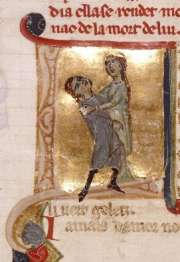|
Биография Jaufré Rudel
Jaufré Rudel de Blaia a fost un om foarte nobil și generos și prinț de Blaia. Și s-a îndrăgostit de contesa de Tripoli, fără a o fi văzut vreodată, și numai pentru vorbele bune pe care le-a auzit despre ea de la pelerinii ce se întorceau din Antiohia. Și a scris despre ea multe versuri cu melodii bune, dar cu cuvinte simple.
Și pentru că voia să o vadă, s-a făcut cruciat și s-a pornit pe mare. Și pe corabie a căzut bolnav și a fost dus la Tripoli aproape mort într-un han. Și aceasta a ajuns la urechile contesei și ea a venit la el, la căpătâiul său și l-a luat în brațe.
Și a știut că ea era contesa, și pe loc și-a redobândit vederea și auzul și l-a lăudat pe Dumnezeu pentru că l-a ținut în viață până a văzut-o. Și astfel a murit el în brațele sale.
Iar ea l-a așezat în mormânt cu mare cinste în casa Templului. Și pe urmă, în aceeași zi, s-a călugărit pentru durerea pe care a dobândit-o prin moartea lui.
Engleză
Jaufre Rudel (Jaufré in modern Occitan) was the Prince of Blaye (Princes de Blaia) and a troubadour of the early–mid 12th century, who probably died during the Second Crusade, in or after 1147. He is noted for developing the theme of "love from afar" (amor de lonh or amour de loin) in his songs.
Very little is known about his life, but a reference to him in a contemporary song by Marcabru describes him as being oltra mar—across the sea, probably on the Second Crusade in 1147. Probably he was the son of Girard, also castellan of Blaye, and who was titled "prince" in an 1106 charter. Girard's father was the first to carry the title, being called princeps Blaviensis as early as 1090. During his father's lifetime the suzerainty of Blaye was disputed between the Counts of Poitou and the Counts of Angoulême. Shortly after the succession of William VIII of Poitou, who had inherited it from his father, Blaye was taken by Wulgrin II of Angoulême, who probably vested Jaufre with it. According to one hypothesis, based on flimsy evidence, Wulgrin was Jaufre's father.
|





